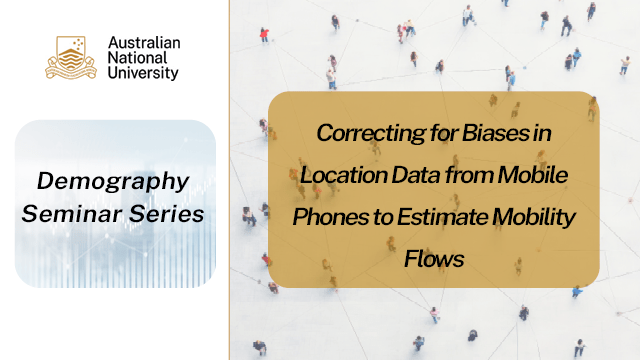Correcting for Biases in Location Data from Mobile Phones to Estimate Mobility Flows

Access to human mobility data is key for a wider variety of social challenges, including urban planning, sustainability, public health and economic development. Location trace data collected through digital technology, such as mobile applications, have become widely available to study human mobility, and overcome key limitations of traditional data streams, such as surveys and censuses. Yet, digital trace data are not representative of the general population, and consequently require statistical adjustment to mitigate existing biases and make robust statistical inferences. While efforts have been made to correct human mobility data from digital sources, no generalisable solution has been proposed to satisfactorily adjust human mobility flows by attributes at the origin and destination areas.
The work of the newly ESRC-funded project DEBIAS is presented, which aims to develop a generalisable framework to measure, assess and correct existing biases in human mobility data extracted from digital trace data. First, a measure is presented to quantify biases in spatial population counts derived from digital trace data, and to identify key demographic, socioeconomic and geographic features underlying these biases. Second, the proposed framework is introduced to mitigate biases in spatial population count data, and generate bias-adjusted human mobility counts from digital trace sources. Third, plans for future work in this area are presented.
Francisco Rowe is a Professor in Population Data Science; the Lead of the Geographic Data Science Lab at the University of Liverpool; and Vice Chair of the Mobile Phone Data Task Team (MPD-TT) at the UN Committee of Experts on Big Data and Data Science for Official Statistics (UN-CEBD). He leads the UN-CEBD Migration Sub-group. His research focuses on human mobility and migration; geographic data science; and spatial inequalities.
It seeks to advance our understanding of the social and climate-related causes and impacts of human movements for communities and individuals through the novel application of geographic data science methodologies and digital trace data. Francisco works closely with various sections of the UN, including the Economic Commission for Latin America and the Caribbean, the International Organization for Migration and the Statistics Division. Francisco is Editor of REGION, the Journal of the European Regional Science Association, and member of the Editorial Board of Population, Space and Place, and Spatial Economic Analysis.
Join Zoom Meeting
https://anu.zoom.us/j/83873550469?pwd=u5NmcuzrPEp4euXUkpxdW6n3VaywlW.1
Meeting ID: 838 7355 0469
Password: 232267
This event was originally published on the School of Demography website.
Location
Zoom or Room 4.69, RSSS Building 146 Ellery Crescent, Acton 2601, ACT
Speaker
- Professor Francisco Rowe
Contact
- Natalie Nitsche